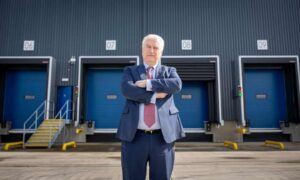
“It’s a monumental white elephant, just painted black,” says Gerald Vernon-Jackson, Portsmouth city council’s cabinet member for transport, standing outside the £23m warehouse, which was completed two years ago.
The 8,000 sq metre facility situated in Portsmouth International Port – the UK’s second busiest cross-Channel terminal – is the home to its border control post (BCP). One of more than 100 registered BCPs, it will be the place where many food and plant products coming through Portsmouth from the EU will be checked when post-Brexit import rules come in on 30 April.
Filled with expensive loading equipment and refrigeration systems, the site has 14 unloading bays, where lorries are expected to be examined, and 22 processing chambers, where plant and meat products will be checked by hand for disease by government inspectors.
But despite millions of pounds being pumped into the south coast project, half of the site will be left empty and unused when it comes into operation next month, and the council is chasing a reimbursement of £6m of the construction costs from government.
“When we built this, it was designed to the exact specifications the government wanted under its previous Border Operating Model. Now we are only expecting to use seven bays and 10 chambers,” says Mike Sellers, the port’s director.
The difficulties at Portsmouth have been replicated to varying degrees across the UK, with millions of pounds spent on facilities that may be only partially used. Unlike the majority of ports across the country, which are privately owned, Portsmouth is owned by the council, meaning the authority picks up the associated costs.
“You will find similar situations with a number of other roll-on-roll-off ports across the country,” says Richard Ballantyne, the chief executive of the British Ports Association.
Since the government first announced it would check imports of products of plant and animal origin after Brexit, ministers have changed their minds on the scope of these checks. This has meant the volume of goods expected to go through BCPs such as Portsmouth has fallen, while the amount of redundant space in these facilities has grown.
“It was built for between 50 and 80 vehicles per day: we are now expecting to process only half a dozen when it opens,” Sellers added.
When the UK left the single market in January 2021, the EU immediately began requiring health certificates for British meat, dairy and plant products, while also introducing physical inspections at EU borders.
The UK is now following suit. The certification scheme is already in place, and inspections on high- and medium-risk imports start next month.
